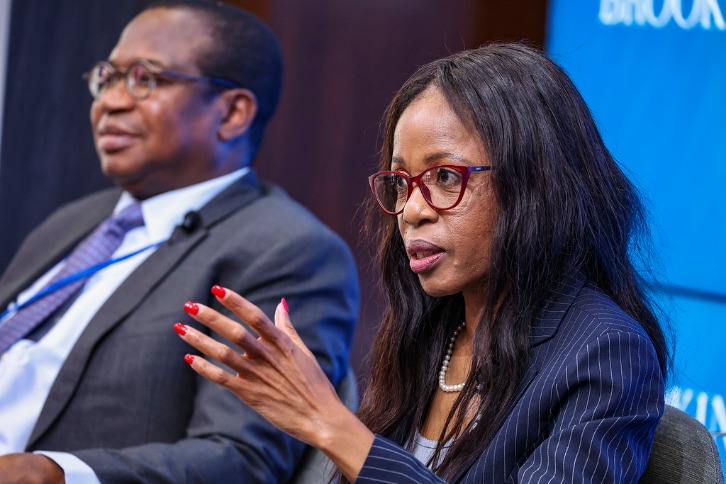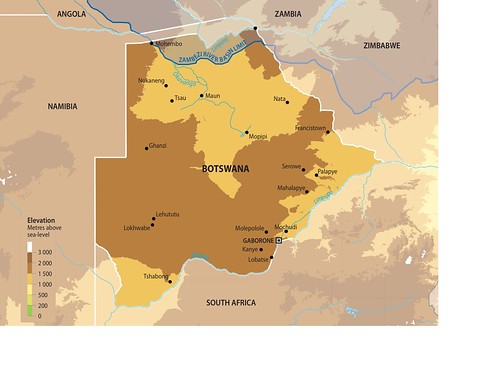Overview of Botswana’s Economy
Botswana’s economy is a dynamic and resilient one, primarily driven by its rich natural resources and stable governance. Known for its diamond mining industry, the country has successfully diversified its economy to include sectors such as agriculture, tourism, and manufacturing. Despite global economic challenges, Botswana has maintained steady growth and continues to develop its infrastructure and human capital, positioning itself as an emerging market in Southern Africa.
Economic Structure and Key Sectors
Botswana’s economy is characterized by steady growth and a largely stable macroeconomic environment, supported primarily by its rich mineral resources. The country has transformed from an economy heavily reliant on diamond mining to one with a diverse economic structure. The key sectors driving Botswana’s economy include mining, particularly diamonds, tourism, agriculture, and manufacturing. Diamond mining remains the backbone of the economy, contributing significantly to government revenue and export earnings. Tourism also plays a vital role, attracting visitors to its unique wildlife and natural landscapes. Agriculture, though smaller in comparison, provides employment and sustains rural communities. The government has been working on economic diversification to reduce dependency on diamonds, aiming to develop sectors like financial services, real estate, and infrastructure to promote sustainable growth in the future. Overall, Botswana’s economic structure reflects a combination of resource-driven growth with ongoing efforts to diversify and strengthen other sectors for long-term stability.
Historical Economic Development
Botswana’s economy is characterized by steady growth and a relatively stable macroeconomic environment, largely driven by its abundant diamond resources. Historically, the country transitioned from a subsistence agriculture-based economy to a more diversified one, with significant contributions from mining, tourism, and manufacturing sectors. During the early years of independence in 1966, Botswana was among the poorest nations, but prudent economic management and strategic investments in mineral extraction transformed its economic landscape. The discovery of diamonds spurred rapid economic development, leading to increased government revenues and infrastructure improvements. Over time, efforts to diversify the economy have focused on sectors such as agriculture, services, and manufacturing to reduce dependence on diamond exports, fostering long-term sustainable growth. Despite challenges like unemployment and income inequality, Botswana’s economic development remains a notable example of resource-led growth in Africa.
Current Economic Indicators
Botswana’s economy is characterized by steady growth driven primarily by its diamond mining industry, which accounts for a significant portion of the country’s revenue and exports. The nation has a well-developed financial sector and a stable political environment that supports economic stability and investment. In recent years, Botswana has been working to diversify its economy by promoting sectors such as tourism, agriculture, and manufacturing to reduce dependence on diamonds.
Current economic indicators suggest moderate growth with a Gross Domestic Product (GDP) estimated to be around $18 billion. The inflation rate remains controlled, hovering around 3-4%, reflecting stable prices. Unemployment remains a challenge, especially among youth, with rates around 17%. The country’s external debt is relatively low, and foreign reserves are sufficiently high to cushion against external shocks. Overall, Botswana’s economy shows resilience and potential for sustainable development, although it faces challenges related to diversification and social inequality.
Mining and Minerals Sector
The Mining and Minerals Sector plays a crucial role in Botswana’s economy, contributing significantly to national revenue and employment. Known for its rich deposits of diamonds, copper, nickel, and other minerals, Botswana has established a robust mining industry that has driven economic growth and development. This sector not only boosts exports but also attracts international investments, making it a vital component of the country’s economic landscape.
Diamond Mining Industry
The mining and minerals sector plays a pivotal role in Botswana’s economy, with diamond mining being the cornerstone of its industrial development. Botswana is renowned for its rich diamond deposits, which have significantly contributed to national revenue, export earnings, and economic stability. The country ranks as one of the world’s leading producers of diamonds, leveraging advanced mining techniques and strong partnerships with international corporations. This industry not only drives economic growth but also provides employment opportunities and fosters infrastructure development across the nation. Continued investment and sustainable practices in the diamond mining industry are vital for maintaining Botswana’s economic resilience and ensuring long-term prosperity.
Other Mineral Resources
The Mining and Minerals Sector in Botswana plays a vital role in the country’s economy, contributing significantly to national revenue and employment. Apart from the well-known diamond industry, Botswana possesses a rich diversity of other mineral resources that have the potential to boost economic growth. These include copper, nickel, cobalt, gold, and iron ore, which are key to diversifying the country’s mineral portfolio. Other mineral resources such as soda ash, salt, and quarry materials also support local industries and export markets. The government actively promotes mineral exploration and development to harness these resources sustainably while attracting foreign investment, aiming to strengthen Botswana’s economic resilience and development prospects.
Impact on National Economy
The Mining and Minerals Sector plays a crucial role in Botswana’s national economy, contributing significantly to GDP, employment, and foreign exchange earnings. As one of the country’s leading industries, mining primarily focuses on diamonds, copper, nickel, and soda ash, which underpin economic stability and growth.
- Generation of Foreign Exchange: Mining exports, particularly diamonds, are vital sources of foreign currency that support the country’s trade balance.
- Employment Opportunities: The sector provides numerous direct and indirect jobs, boosting local communities and reducing poverty levels.
- Infrastructure Development: Revenue from mining activities has led to improved infrastructure, including roads, schools, and healthcare facilities.
- Revenue for Government: Taxes, royalties, and licensing fees from mining companies contribute substantially to national revenue and government budgets.
Despite its benefits, reliance on mineral exports also poses challenges such as economic vulnerability to global commodity price fluctuations and environmental concerns. Nonetheless, Botswana’s strategic management of its mining resources continues to be a vital component of its economic development and stability.
Agriculture and Livestock
Agriculture and livestock play a vital role in Botswana’s economy, providing sustenance and livelihood for a significant portion of its population. These sectors contribute to food security, employment, and export revenue, supporting the country’s overall economic stability. With a focus on sustainable practices, Botswana aims to strengthen its agricultural and livestock industries to promote long-term growth and development.
Main Agricultural Products
Agriculture and livestock play a vital role in Botswana’s economy, providing livelihoods for a significant portion of the population and supporting rural development. The sector primarily focuses on livestock farming, with cattle being the most prominent and crucial for both local consumption and export. Agriculture in Botswana also includes crops such as sorghum, millet, maize, and vegetables, although their production is often limited by arid conditions and periodic droughts.
Main agricultural products in Botswana include beef, which is a major export commodity, as well as crops like sorghum, millet, maize, and various vegetables. Livestock farming, especially cattle, is deeply embedded in the country’s economic and cultural fabric, contributing significantly to income generation and food security. Despite challenges such as climate variability, the government continues to promote sustainable farming practices to enhance productivity and resilience within the agricultural sector.
Challenges in Agriculture
Agriculture and livestock play a vital role in Botswana’s economy, providing livelihood for a significant portion of the population and contributing to food security. However, the sector faces numerous challenges that hinder its growth and sustainability.
One of the primary challenges is climate variability, including frequent droughts and irregular rainfall patterns, which negatively impact crop yields and water availability. This climatic uncertainty makes planning and investments difficult for farmers. Additionally, soil degradation and land deterioration further reduce agricultural productivity, posing long-term threats to food security.
Limited access to modern technology and farming inputs remains a significant obstacle, preventing farmers from increasing efficiency and output. The high cost of agricultural inputs, such as seeds, fertilizers, and equipment, restricts smallholder farmers’ ability to expand production. Livestock farming also faces issues like disease outbreaks, poor veterinary services, and limited access to quality feed and water sources.
Furthermore, inadequate infrastructure, including storage facilities and transportation networks, hampers the distribution of agricultural produce and increases post-harvest losses. Land tenure issues and lack of sufficient support services, such as extension services and finance, also constrain the sector’s development.
Addressing these challenges requires comprehensive policies that promote sustainable farming practices, improve infrastructure, and facilitate access to technology and financial services. Strengthening resilience to climate change and investing in agricultural research are essential for ensuring the sector’s contribution to Botswana’s economic stability and growth.
Role of Livestock Farming
Livestock farming plays a significant role in Botswana’s economy by providing vital income and employment opportunities for rural communities. It contributes to food security through the production of meat, dairy, and hides, which are important both locally and for export markets. The livestock sector also supports related industries such as leather manufacturing and animal feed production, boosting overall economic growth. Additionally, sustainable livestock practices help preserve traditional pastoral ways of life while promoting environmental management. As a key component of Botswana’s agricultural sector, livestock farming continues to be essential for economic diversification and rural development.
Tourism Industry
The tourism industry plays a vital role in Botswana’s economy, contributing significantly to its growth and development. Known for its stunning landscapes, diverse wildlife, and vibrant culture, Botswana attracts visitors from around the world. This sector not only generates income and employment opportunities but also promotes sustainable tourism practices that help preserve the country’s natural beauty for future generations.
Natural Attractions and Cultural Heritage
The tourism industry plays a vital role in Botswana’s economy, significantly contributing to GDP, employment, and foreign exchange earnings. The country is renowned for its stunning natural attractions, including the expansive Okavango Delta, Chobe National Park, and the Makgadikgadi Pans, which draw countless visitors seeking wildlife safaris and unique ecosystems. Additionally, Botswana’s rich cultural heritage, characterized by diverse tribes, traditional music, dance, and ancient rock art, offers visitors an immersive experience that highlights the nation’s history and customs. This combination of natural beauty and cultural richness makes tourism an essential sector for sustainable economic growth in Botswana.
Tourism Statistics and Revenue
The tourism industry plays a vital role in Botswana’s economy, contributing significantly to national revenue and employment. In recent years, the country has seen steady growth in tourist arrivals, driven by its abundant wildlife and protected national parks such as Chobe and Moremi. Tourism statistics indicate an increase in international visitors, with a notable boost in eco-tourism and safari experiences that showcase Botswana’s natural beauty. The revenue generated from tourism has become a crucial source of foreign exchange, supporting infrastructure development and community projects. As the government continues to invest in sustainable tourism initiatives, the industry is expected to expand further, enhancing Botswana’s economic stability and global reputation as a premier travel destination.
Government Initiatives to Promote Tourism
The tourism industry plays a vital role in Botswana’s economy by generating revenue, creating employment opportunities, and promoting cultural exchange. Recognizing its significance, the government has implemented several initiatives to boost tourism, including the development of infrastructure, the promotion of eco-tourism, and investment in wildlife conservation. These efforts aim to attract more international visitors and position Botswana as a premier travel destination. Additionally, government campaigns and partnerships with private sectors are tailored to enhance marketing strategies, improve tourist facilities, and ensure sustainable tourism practices that benefit both the economy and the environment.
Manufacturing and Industrial Development
Manufacturing and industrial development play a crucial role in shaping the economic growth of Botswana. These sectors drive innovation, create employment opportunities, and contribute significantly to the country’s GDP. As Botswana continues to diversify its economy, investing in industrial development becomes essential for sustainable progress and improved living standards.
Key Manufacturing Sectors
Manufacturing and industrial development play a crucial role in the economic growth of Botswana, contributing significantly to employment, infrastructure, and exports. The government’s focus on diversifying the economy has led to the expansion of several key manufacturing sectors, fostering sustainable development and increased competitiveness in the region.
Key manufacturing sectors in Botswana include diamond processing, textiles and apparel, food and beverages, and construction materials. Diamond processing remains a dominant industry due to the country’s rich mineral deposits, enabling value addition and export growth. The textiles and apparel sector is growing, supported by regional trade agreements, aiming to reduce reliance on imports. Food and beverage manufacturing, including processing of agricultural products, helps enhance food security and create jobs. The construction materials sector, producing cement, bricks, and other building supplies, supports infrastructure development across the country.
Overall, these sectors form the backbone of Botswana’s industrial landscape, driving economic diversification and resilience amid global market fluctuations. The continued development of these key industries is vital for the country’s long-term economic stability and growth.
Industrial Policy and Promotion
Manufacturing and industrial development play a crucial role in Botswana’s economic growth and diversification. The country has historically relied on diamond mining, but recognizing the need to reduce dependence on a single sector, Botswana’s government has focused on promoting a vibrant manufacturing industry to generate employment and foster sustainable development.
Industrial policy in Botswana emphasizes creating a conducive environment for local businesses and attracting foreign investment. Policies are designed to encourage modern manufacturing practices, improve infrastructure, and develop human capital to support an expanding industrial base. The government also prioritizes technological advancement and innovation to increase competitiveness and productivity.
Promotion initiatives include establishing Special Economic Zones, offering incentives for manufacturing startups, and supporting small and medium enterprises. These efforts aim to diversify Botswana’s economy, boost exports, and integrate into regional and global value chains. Overall, sustainable industrial development remains a key pillar in Botswana’s broader economic strategy to ensure long-term growth and stability.
Contribution to GDP
The manufacturing and industrial development sector plays a significant role in Botswana’s economy, contributing substantially to the country’s Gross Domestic Product (GDP). This sector encompasses the production of goods ranging from textiles and food products to chemicals and machinery, which are essential for domestic consumption and export. As Botswana continues to diversify its economy beyond diamond mining, the growth of manufacturing industries has become crucial for sustainable economic development. The contribution of the manufacturing sector to GDP not only boosts employment opportunities but also enhances technological advancement and industrial capacity within the country. Overall, the development of this sector is vital for Botswana’s economic resilience and long-term prosperity.
Financial Sector and Investment Climate
The financial sector in Botswana plays a crucial role in shaping the country’s overall economic stability and growth. A supportive investment climate encourages both local and foreign investors to participate actively in various sectors, fostering sustainable development. Understanding the dynamics of Botswana’s financial environment is essential to grasp the opportunities and challenges that influence the nation’s economic progress.
Banking and Financial Services
Botswana’s financial sector plays a crucial role in the country’s economic stability and growth. The banking and financial services industry has experienced significant development, fostering a conducive investment climate that attracts both domestic and international investors. Strong regulatory frameworks and a focus on digital transformation have enhanced service delivery and financial inclusion across the nation.

Foreign Direct Investment
Botswana’s financial sector and investment climate play a crucial role in shaping the country’s economic stability and growth potential. The country has established a relatively stable banking system and developed financial markets, which attract both local and international investors. Efforts to improve transparency and regulatory frameworks have enhanced investor confidence, fostering a conducive environment for business development. Additionally, Botswana’s strategic efforts to diversify its economy beyond diamond mining have been supported by initiatives aimed at strengthening the financial sector.
Foreign Direct Investment (FDI) in Botswana has historically been a significant driver of economic growth. The government offers various incentives and policies to attract FDI, particularly in sectors such as mining, agriculture, tourism, and services. Botswana’s political stability, sound macroeconomic management, and commitment to economic reforms make it an appealing destination for foreign investors. Continued focus on improving infrastructure, legal frameworks, and ease of doing business is expected to further boost FDI inflows, contributing to sustainable economic development and diversification efforts.
Economic Reforms and Business Environment
Botswana’s economy is characterized by a stable financial sector that has fostered a conducive investment climate, attracting both local and international investors. The country has implemented a series of economic reforms aimed at enhancing transparency, improving regulatory frameworks, and encouraging entrepreneurship, which collectively bolster the business environment. These reforms have led to a more open and efficient economic system, promoting sustainable growth and development. Additionally, Botswana’s commitment to prudent fiscal policies and investment-friendly initiatives has positioned it as a reliable destination for investment, particularly in sectors such as mining, tourism, and agriculture. The ongoing efforts to strengthen the financial sector and reform the broader economic landscape are vital for ensuring continued prosperity and resilience in Botswana’s economy.
Employment and Human Capital
Employment and human capital are vital components of Botswana’s economic development, shaping the country’s productivity and growth prospects. A skilled and motivated workforce can drive innovation, attract investments, and enhance competitiveness in various sectors. Understanding the dynamics of employment and investing in human capital are key to sustainable economic progress in Botswana.
Labor Market Overview
Burundi’s economy relies heavily on agriculture, with the sector providing employment for a significant portion of the population. The labor market presents a mix of formal and informal employment, with many workers engaged in subsistence farming and small-scale enterprises. Despite steady economic growth in recent years, unemployment remains a challenge, particularly among youth and women, indicating the need for targeted policies to boost human capital development. Investment in education and skills training is crucial to improve productivity and prepare the workforce for diversified opportunities. Enhancing vocational training and increasing access to quality education are key strategies to strengthen Botswana’s labor market and promote sustainable economic growth.
Skills Development and Education
Botswana’s economy has historically been driven by diamond mining, but there is an increasing recognition of the importance of employment and human capital development to ensure sustainable growth. Investing in skills development and education is essential for diversifying the economy and reducing dependency on mineral resources. The government has initiated various programs to improve access to quality education, promote vocational training, and foster innovation among its workforce. Enhancing human capital not only increases productivity but also attracts foreign investment and encourages entrepreneurship. As Botswana continues to evolve economically, a focus on building a skilled, adaptable workforce will be crucial for long-term prosperity and resilience in the global market.
Unemployment Trends
Employment and human capital are crucial indicators of Botswana’s economic development, reflecting the country’s ability to harness its workforce for growth and innovation. Over recent years, Botswana has focused on improving education and skills development to enhance productivity and competitiveness in various sectors, including mining, agriculture, and services.
Unemployment trends in Botswana have shown some fluctuations, with rates remaining a concern for policymakers. Youth unemployment and underemployment are particularly pressing issues, impacting social stability and economic sustainability. The government has implemented initiatives to create more job opportunities, promote skill acquisition, and attract investments that can generate employment for the growing population.
Efforts to strengthen human capital are essential for Botswana to transition into a more diversified and resilient economy. By investing in education, vocational training, and innovation, the country aims to reduce unemployment levels and improve the overall quality of its workforce, fostering long-term economic prosperity.
Economic Challenges and Risks
Botswana’s economy faces a range of challenges and risks that could impact its growth and stability. Despite its reputation for steady development and prudent management, the country is vulnerable to global economic fluctuations, fluctuating commodity prices, and domestic issues such as unemployment and infrastructure needs. Understanding these economic challenges is crucial for implementing policies that ensure sustainable progress for Botswana’s future.
Dependence on Diamond Revenue
Botswana’s economy faces significant challenges and risks primarily due to its heavy dependence on diamond revenue. This reliance makes the country vulnerable to fluctuations in global commodity prices, which can impact national income, government expenditure, and overall economic stability.
- Volatility in global diamond markets can lead to unpredictable revenue streams, affecting public investment and social programs.
- Over-reliance on a single resource exposes Botswana to economic shocks if demand declines or mining resources are depleted.
- Limited diversification hampers sustainable growth and resilience against external economic pressures.
- Global shifts towards alternative materials and changes in consumer preferences could reduce demand for diamonds in the future.
- Environmental and social issues associated with mining activities pose additional risks to the country’s long-term economic sustainability.
Economic Diversification Efforts
Botswana’s economy faces several challenges and risks that could impact its growth and stability. Dependence on a limited number of sectors, such as diamond mining, makes it vulnerable to fluctuations in global commodity prices. Additionally, issues like unemployment, particularly among the youth, and income inequality pose ongoing socio-economic difficulties. Environmental concerns, including water scarcity and the need for sustainable resource management, also threaten long-term economic stability.
To address these issues, Botswana has been making efforts to diversify its economy beyond diamond mining. These initiatives aim to develop other sectors such as agriculture, tourism, manufacturing, and services, ensuring more balanced economic growth and reducing reliance on a single source of revenue.
- Implementing policies to promote private sector development
- Investing in education and workforce skills to support diversification
- Encouraging foreign direct investment into new sectors
- Enhancing infrastructure and technological innovation to attract different industries
- Promoting sustainable resource management and environmental conservation
Socioeconomic Issues
Botswana’s economy faces a range of challenges and risks that impact its growth and stability. Dependence on diamond mining makes the economy vulnerable to fluctuations in global commodity prices, which can lead to economic volatility. Additionally, high unemployment rates, especially among youth, pose socioeconomic issues, limiting income opportunities and increasing poverty levels. Limited diversification beyond diamonds restricts the country’s ability to sustain long-term economic growth, making it susceptible to external shocks. Socioeconomic disparities, including unequal access to education and healthcare, further exacerbate social tensions and hinder inclusive development. Infrastructure deficits and inadequate access to financial services also hinder small businesses and entrepreneurs, constraining economic resilience. Addressing these challenges requires robust policy interventions aimed at diversification, social equity, and sustainable development to ensure Botswana’s economic stability and improved quality of life for its citizens.
Future Outlook and Development Strategies
The future outlook for Botswana’s economy is shaped by strategic development initiatives focused on diversification and sustainable growth. As the country seeks to reduce its dependence on diamond mining, it is implementing innovative policies and investing in sectors such as tourism, agriculture, and information technology. These development strategies are aimed at fostering a resilient economy, creating employment opportunities, and enhancing overall national prosperity in the coming years.
Government Development Plans
The future outlook for Botswana’s economy appears promising, driven by strategic development initiatives aimed at diversifying beyond its traditional reliance on diamond mining. The government is focused on fostering growth in sectors such as tourism, agriculture, manufacturing, and services to ensure sustainable development and resilience against global market fluctuations.
Development strategies in Botswana include investments in infrastructure, education, and technology to enhance productivity and attract foreign investment. The government emphasizes sustainable resource management, environmental conservation, and the promotion of local industries to support long-term economic stability. Policies are also being implemented to improve governance, ease of doing business, and expand social services, all of which are vital for economic advancement.
In terms of government development plans, Botswana aims to position itself as a regional hub for logistics and trade, leveraging its geographic location. The National Development Plan (NDP) series guides these efforts, focusing on expanding economic diversification, reducing income inequality, and fostering innovation. With these initiatives, Botswana aims to achieve higher GDP growth rates, increased employment opportunities, and improved standards of living for its citizens in the coming years.
Potential Growth Sectors
The future outlook for Botswana’s economy appears promising, driven by strategic development initiatives and an increasing focus on diverse growth sectors. The government is actively promoting sustainable development, diversification, and innovation to reduce reliance on diamond exports and foster long-term economic stability.
- Enhancing tourism through eco-friendly and cultural tourism initiatives to attract more international visitors.
- Expanding the mining sector beyond diamonds, including minerals like copper, nickel, and coal, to diversify revenue sources.
- Investing in agriculture and agro-processing to boost food security and generate employment opportunities.
- Developing the renewable energy sector, particularly solar and wind power, to meet domestic energy needs and explore export possibilities.
- Promoting the growth of information technology and digital services to foster innovation and attract tech enterprises.
- Supporting small and medium-sized enterprises (SMEs) to stimulate local entrepreneurship and economic resilience.
- Increased regional integration within the Southern African Development Community (SADC), opening new markets for Botswana’s goods and services.
- Implementing infrastructural improvements, including transportation and logistics, to facilitate trade and economic activities.
- Fostering public-private partnerships to leverage investment and expertise in key growth areas.
- Prioritizing education and workforce development to equip citizens with skills needed for emerging sectors.
- Adopting innovative policies to attract foreign direct investment and support sustainable growth initiatives.
Regional and Global Economic Influences
The future outlook for Botswana’s economy appears cautiously optimistic, driven by ongoing diversification efforts and investments in sustainable sectors. Development strategies focusing on enhancing mining technologies, promoting tourism, and expanding agricultural productivity are essential for long-term growth. Regional economic influences, particularly from neighboring South Africa and Zimbabwe, continue to impact Botswana’s trade and investment climate, offering both opportunities and challenges. Globally, shifts in commodity prices, especially for diamonds and minerals, will significantly influence Botswana’s economic stability. Furthermore, global initiatives toward renewable energy and sustainable development may open new avenues for Botswana to diversify its economy and achieve resilient growth in the coming years.





0 Comments